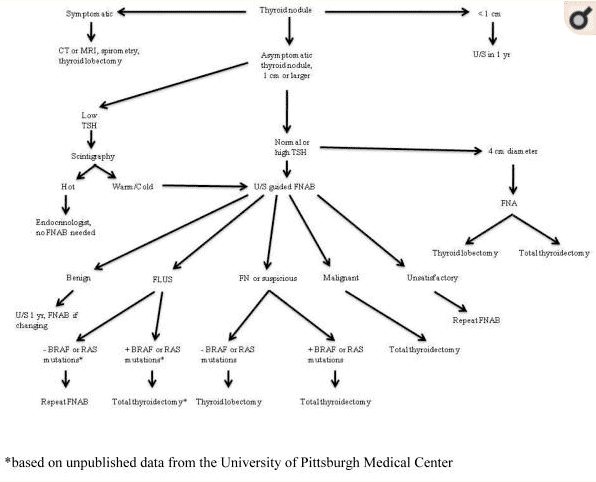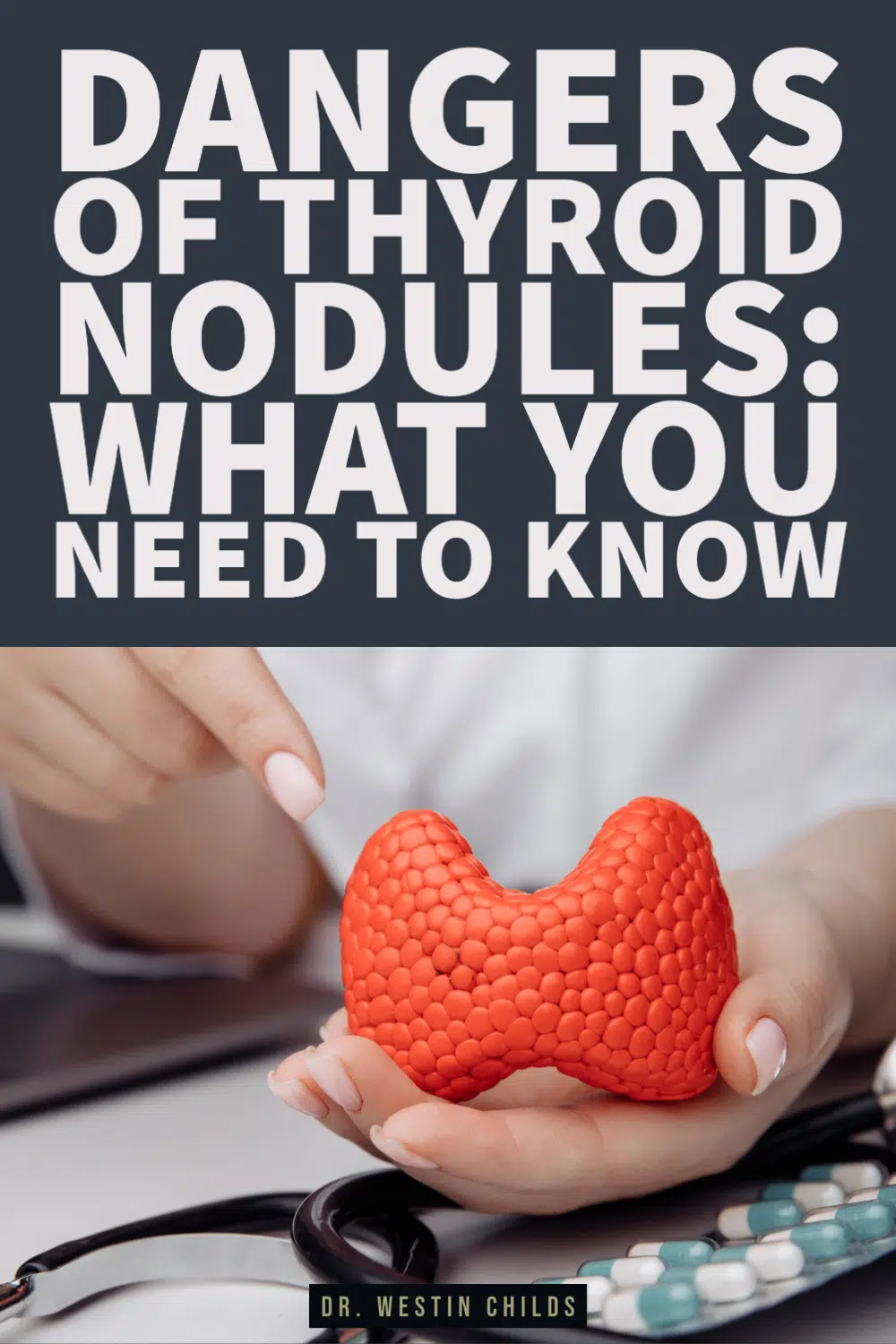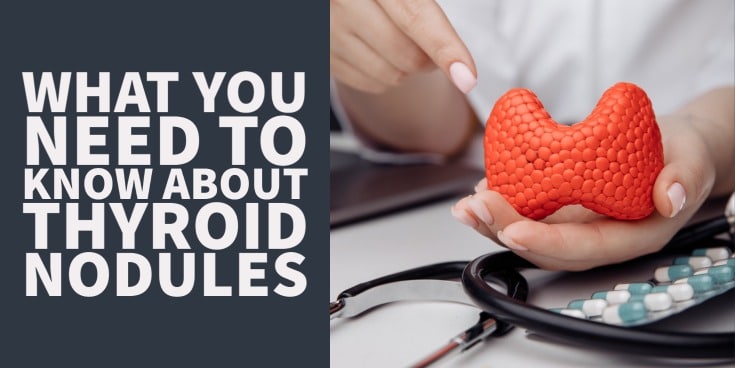Have you been recently diagnosed with a thyroid nodule?
Do you have a thyroid nodule and you are wondering what it means or how to treat it?
Are you looking for treatment options, including natural and conventional, for your thyroid nodule?
All of these and more will be discussed in this beginner’s guide to thyroid nodules designed specifically for patients.
Learn the basics of thyroid nodules including symptoms that may be associated with your nodule, how to diagnose and manage your nodule, and more in this guide:
What is a Thyroid Nodule?
Put in simple terms a thyroid nodule is a piece of tissue in your thyroid gland that is different from the surrounding tissue (1).
This “unusual” tissue is often in a defined area or mass which is referred to as a “nodule”.
These nodules vary in both size and consistency and it is these features that make them worrisome (or not).
Your thyroid gland is a small endocrine (hormone) gland that sits at the base of your neck.
Under the influence of your brain (both the pituitary and hypothalamus), it produces some of the most important hormones in your body: T3 and T4.

The thyroid gland is a spongy, glandular organ that should be uniform in consistency and to the touch.
Nodules represent a change in the structure, look, or feel of that tissue.
Doctors (and patients) tend to identify thyroid nodules either through routine physicals (by simply touching the gland and feeling an inconsistency) or through imaging studies such as a chest CT scan or neck ultrasound.
These nodules are INCREDIBLY common among the entire population with an estimated 4 to 7% of the population having one (2).
Female patients and patients who are older tend to get thyroid nodules more often than other populations.
If nodules are so common why do Doctors get so worried about them?
Several reasons:
One reason has to do with the fact that SOME thyroid nodules are potentially malignant (or can turn into cancer).
Another reason is that thyroid nodules themselves may actually cause thyroid gland damage and impair your ability to produce thyroid function.
The inability to produce thyroid hormone adequately is referred to as hypothyroidism. Patients with hypothyroidism often present with fatigue, weight gain, hair loss, and many other symptoms.
Other thyroid nodules can actually produce excessive thyroid hormone leading to a condition known as hyperthyroidism (you can read more about that here).
And lastly, but rarely, thyroid nodules can cause issues in your neck which include compression of your vocal cords and other neck structures.
DOWNLOAD FREE RESOURCES
Foods to Avoid if you Have Thyroid Problems:
I’ve found that these 10 foods cause the most problems for thyroid patients. Learn which foods you should avoid if you have thyroid disease of any type.
The Complete List of Thyroid Lab tests:
The list includes optimal ranges, normal ranges, and the complete list of tests you need to diagnose and manage thyroid disease correctly!
Are thyroid Nodules Dangerous?
The short answer is probably not, the longer answer is maybe.
Most thyroid nodules (more than 94%) are benign (3).
Benign means that they really don’t pose any harm or threat to your body.
But, just because most don’t turn into cancer doesn’t mean that all nodules are benign.
It is estimated that up to 4.0 to 6.5% of all thyroid nodules (4), when biopsied, will come back positive for malignancy or cancer.
And it is this small percentage (about 1 in 20) that we get worried about.
What makes thyroid nodules cancerous and others benign is not clear.
It is felt that some thyroid nodules may turn into thyroid cancer over a long period of time (years to decades) and this is why thyroid nodules are monitored so closely.
So how do you know if your thyroid nodule is benign or dangerous?
By looking at the characteristics of the thyroid nodule with ultrasound (5) and on physical exam.
The following findings may increase the likelihood that you have thyroid cancer (6):
- Very large nodules (those which are larger than 4cm in size) – The bigger the nodule the more likely it is to be cancerous
- Firmness of the nodule when feeling it (nodules which are hard and not “squishy”)
- Fixation of the nodule to surrounding tissues (it may look like the nodule is pulling other tissue towards it)
- Enlarged lymph nodes in the neck or near the nodule
- Changes to vocal cords or hoarseness
- Microcalcifications (seen on ultrasound)
- The absence of a “halo” (seen on ultrasound)
- Hypoechoic (seen on ultrasound)
- Increased intranodular flow (seen on ultrasound)

These findings, if present, may increase the risk that your thyroid nodule is more than just a regular thyroid nodule.
Please notice that they are not 100% specific, however, so further testing such as a biopsy should be the next step!
And, on the flip side, it is still possible to have a thyroid nodule that has none of these findings still be cancerous (it’s just much less common).
Note: You can find these “keywords” or “buzzwords” on the radiology report in the impression section of your ultrasound report.
Do Thyroid Nodules cause Symptoms?
Most thyroid nodules are actually asymptomatic (7), which means that they do NOT cause symptoms.
The majority of these nodules are often found by accident, usually during a routine physical exam where your doctor may feel or palpate your neck/thyroid gland.
Occasionally, however, patients may experience changes to thyroid function which prompts a visit to the doctor.
Those patients who experience symptoms can either experience the symptoms of too much thyroid hormone or the symptoms associated with too little thyroid hormone.

The way that you present largely depends on the size of your nodule, co-existing medical conditions, your personal history, and so forth.
You can use the guide below to help determine if you may be experiencing symptoms related to your thyroid nodule.
Symptoms you may experience if your nodule produces thyroid hormone:
These nodules can produce thyroid hormone outside of the normal regulatory loops that exist in your body.
These nodules are often considered “hot” or active and patients who have these nodules may experience the symptoms associated with hyperthyroidism.
Symptoms such as:
- Heart palpitations
- Excessive sweating
- Insomnia
- Tremors
- Weight loss
- Hot flashes/warm flushes
- Diarrhea
Symptoms you may experience if your nodule reduces thyroid function or damages the thyroid:
Other patients may experience a reduction of thyroid hormone from their thyroid gland from thyroid nodules.
Sometimes the nodules themselves may become large enough to interfere with normal function or they may be the result of inflammation from Hashimoto’s thyroiditis.
In either event, patients with these types of nodules may experience symptoms such as:
- Fatigue
- Hair loss
- Weight gain
- Constipation
- Dry skin
- Brain fog
- Depression
These symptoms are usually the result of DECREASED thyroid hormone production which may be secondary to a thyroid nodule or the result of some OTHER cause.
If you are suffering from these symptoms (you can see the complete list here) be sure to check your thyroid lab tests in addition to a thyroid ultrasound (more on testing below).
Symptoms you may experience if your nodule is large or cancerous:
Rarely, the thyroid nodule can cause symptoms itself simply due to its size.
This tends to occur more frequently with very large thyroid nodules and with thyroid cancer.
These symptoms are usually caused by local compression of important neck structures or from cancer cells which cause pain or lymph node enlargement.
Symptoms that fit into this category include:
- Enlarged lymph nodes
- Pain when swallowing
- Difficulty with breathing
- Hoarseness or changes to your voice
- Pain in the thyroid gland
What causes Thyroid Nodules?
Believe it or not, we aren’t exactly sure what causes thyroid nodules.
In some cases, the cause can be identified, but in many cases, it’s not clear.
Known causes of thyroid nodules include:
- Overgrowth of thyroid gland tissue – This is perhaps the most common cause of thyroid nodules among patients. We aren’t really sure what causes this overgrowth of tissue but it may have something to do with a combination of genetics, diet, nutrient deficiencies, and environmental triggers. Some patients, especially those with a positive family history, are more likely to develop thyroid nodules. This cause may be the most concerning because it isn’t clear what causes just a regular growth of gland tissue versus cancerous growth of the tissue. For this reason, it’s always important to monitor your nodule size over time.
- Iodine deficiency – Another known cause of thyroid nodules is iodine deficiency. In the United States, a place considered to be iodine “replete”, this cause is felt to be uncommon. A closer look at this topic suggests that perhaps many patients are not getting adequate iodine from their diet. Iodine is primarily found in sea vegetables and iodinated salt, but if your diet is lacking in either of these sources there’s a high chance you may be deficient. In addition, pregnant women and lactating women have a higher demand for iodine than normal adults.
- Chronic inflammation/Thyroiditis – Any condition which results in chronic and low-grade inflammation may result in tissue overgrowth, scarring, or cancer (8). This mechanism may occur with conditions that cause inflammation in the thyroid gland, known as thyroiditis, such as Hashimoto’s or Graves’ disease. These conditions cause inflammation through antibodies produced by the body and are known as autoimmune diseases. These disease states are VERY common and may be one of the reasons for the high incidence of thyroid nodules.
- Thyroid cancer – While some conditions listed above may result in thyroid cancer over a long period of time, some patients present with thyroid cancer much more quickly. Therefore, thyroid cancer is a potential cause of thyroid nodules and must be diagnosed and treated quickly.
- Radiation exposure – Radiation exposure has been known to cause cellular damage and may precipitate thyroid nodule formation in some patients. Radiation dose and exposure increase the risk of both thyroid cancer and thyroid nodules (9). The thyroid gland is exquisitely sensitive to radiation which is why iodine (in high doses) is recommended if you’ve been exposed to it.
These are the known causes of thyroid but just realize that there are probably many other causes that we aren’t aware of at this time.
It’s important to try and identify the cause of thyroid nodules in your body because some cases may be preventable and/or reversible.
Take for instance iodine deficiency:
Supplementation with iodine, if you are deficient, will reduce thyroid gland size and may eliminate any thyroid nodules in your body.
Other causes, such as inflammation, while difficult to treat, may still be worth exploring therapies and treatments which can help reduce inflammation and balance immune function (therapies such as stress reduction, dietary intervention, exercise, and so on).
Thyroid Nodule Treatment
There are 3 ways to think about thyroid nodule treatment:
- Removing the nodule – In most cases, you will NOT need to remove the thyroid nodule as it often requires removal of functioning thyroid gland tissue. This therapy is usually reserved for nodules that are cancerous or which are producing thyroid hormone (causing hyperthyroidism).
- Monitoring the nodule – This is probably the most common way to “treat” thyroid nodules. Monitoring your nodule usually includes regular visits to the Doctor for physical exams and routine ultrasounds at regular intervals. If your nodule changes over time your Doctor can order a biopsy or recommend removal if necessary.
- Attempting to shrink the nodule – Another way to manage thyroid nodules is to attempt to shrink them through various therapies. This treatment may be difficult but worth exploring in certain situations. The problem with attempting to shrink or eliminate thyroid nodules is that this can’t be done reliably and it often depends on the cause of the nodules in your body.
Removing and monitoring thyroid nodules are by far the most recommend therapies, so I won’t focus on those in this section.
Many patients, however, are interested in trying to shrink their thyroid nodules and often want to know if this is even a possibility.
The answer is that this may be possible in some cases and in some patients (but not all).
Determining if your nodule can be reduced in size likely has to do with the cause.
Certain situations, such as iodine deficiency (10), can be treated relatively easily with iodine supplementation.
But what about other causes of thyroid nodules such as the overgrowth of thyroid gland tissue?
This is less certain, but may be possible.
Understanding how we can shrink the tissue involves understanding the physiology of the thyroid tissue itself.
We know that thyroid tissue is stimulated to grow by a certain hormone known as thyroid stimulating hormone.
For this reason, some Doctors recommend suppressive doses of thyroid hormone to help reduce the TSH (12).
Taking thyroid medication (of any kind) will block TSH production from the pituitary by helping supply your body directly with thyroid hormones.
This therapy is often employed in thyroid cancer but it isn’t routinely recommended for patients with run-of-the-mill thyroid nodules.
But we can still use some of this information to help approach natural therapies and treatments for thyroid nodules.
If we can increase normal thyroid hormone production then we may be able to naturally reduce TSH levels in the body.
This is the idea behind natural therapies for thyroid nodules.
It isn’t always possible but it may be worth exploring if the “wait and see” approach is not appealing!
Natural therapies that may help treat thyroid nodules include:
- Supplementation with Zinc and Selenium
- Optimizing T4 to T3 conversion through supplements, lifestyle changes, diet, and exercise
- Taking thyroid medication/supplements (such as T2 or T3/T4)
- Reducing inflammation in the body
- Attempting to optimize immune function
- Adopting healthy habits such as stress reduction, meditation, yoga, etc.
If you opt to use natural therapies just realize that they may not work for each person and be sure to discuss these options with your Doctor.
Lab Testing & Ultrasound Testing
If you have a known thyroid nodule, or if you suspect a thyroid nodule, then the next step is to undergo testing.
Testing, in this case, takes the form of 2 different modalities:
The first is lab testing which helps to assess how well your thyroid is working.
And the second is to directly assess the thyroid itself through ultrasound imaging.
Thyroid lab tests give you an idea of how responsive your thyroid gland is and if your thyroid nodule is causing any impairment in the ability of your gland to produce thyroid hormone.
These characteristics are important because they can help your doctor determine if your nodule looks suspicious or if you are at increased risk for thyroid cancer.
If your nodule looks suspicious on thyroid ultrasound then your Doctor will likely order a fine needle aspiration (FNA for short) (14).
FNA is the best way to determine if your nodule is cancerous and if it needs to be removed, but not everyone should get an FNA unless absolutely necessary.
The reason is that up to 25% of all FNA biopsy results come back as “indeterminate” which means it could be cancer or it could be benign, it’s medical terminology for “I’m not sure”.
Having an indeterminate result on your biopsy can be stressful and may require further imaging studies and biopsies over time.
More recently, newer tests (such as genetic testing) have come out which can be combined with biopsy results and ultrasound imaging (15) to give you a better idea as to the risk of your nodule turning malignant.
Your doctor should help you through this process and help you determine what your next steps should be.
As the patient, you just need to make sure that you get both your ultrasound AND thyroid lab tests at the beginning of this workup (if your physician doesn’t order them automatically).
Conclusion
Thyroid nodules are important to understand because they have the potential to be cancerous and/or damage or alter thyroid gland function.
The good news is that the vast majority of all thyroid nodules are completely benign and will NOT require further work-up beyond monitoring them.
Most patients who have thyroid nodules will not experience symptoms associated with the nodule, but it’s still important to assess thyroid lab tests if a nodule is identified.
Once identified you may need further testing such as a thyroid ultrasound or a biopsy.
Now I want to hear from you:
Do you have thyroid nodules?
Are you trying to naturally treat them?
Do you have symptoms of low thyroid function or high thyroid function?
What has worked for you?
Leave your comments below!








